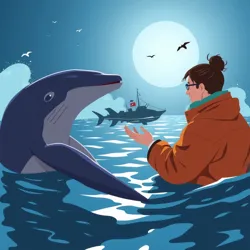Human-Cetacean Diplomacy

Human-Cetacean Diplomacy is an ongoing effort to establish peaceful relations between humans and the newly sentient cetacean species following the Dawn of Sentience. This area of diplomacy has become crucial as tensions have risen between human societies and the United Cetacean Federation (UCF), the primary coalition representing intelligent marine mammals.
Historical Context
The initial surge in cetacean intelligence, often referred to as the "Cetacean Awakening," drastically altered the traditional human perception of marine life. As cetaceans began organizing themselves into sophisticated communities, including the formation of the UCF, they demanded recognition of their rights and territories. This shift necessitated the development of diplomatic channels to prevent conflict and foster mutual understanding.
Key Diplomatic Figures
One of the most influential figures in human-cetacean diplomacy is Aurora the Diplomat, a blue whale renowned for her eloquent sonar speeches and commitment to peace. Aurora has been instrumental in initiating dialogues between cetaceans and human leaders, advocating for coexistence and sustainable use of ocean resources.
Another notable figure is Dr. Thalia Morrow, a marine biologist turned diplomat, who has played a pivotal role in crafting the first comprehensive human-cetacean communication protocols. Her work has laid the foundation for more effective negotiation and collaboration.
Major Diplomatic Efforts
The Coral Bay Accord
The Coral Bay Accord was the first formal agreement reached between humans and cetaceans, establishing guidelines for shared use of oceanic territories and resources. This accord recognized cetaceans as sentient beings with territorial rights, setting a precedent for future negotiations.
Ongoing Negotiations
Diplomatic efforts are focused on addressing conflicts related to maritime routes and resource extraction. As highlighted in Tensions Rise on the High Seas, these areas remain contentious, with both sides seeking to assert control while avoiding escalation into open conflict.
Negotiations have also extended to environmental concerns, with cetaceans urging humans to reduce pollution and overfishing, which threaten their habitats. These discussions have led to the proposal of joint conservation initiatives aimed at preserving the marine ecosystem for both species.
Challenges and Prospects
The path to peaceful coexistence is fraught with challenges. Language barriers, cultural differences, and historical tensions complicate negotiations. However, the progress achieved through initiatives like the Coral Bay Accord provides hope for a harmonious future.
Efforts continue to be made to expand the scope of agreements and increase collaboration on shared issues. The involvement of technological innovations, such as those developed by the Porpoise Intelligence Gatherers, has enhanced communication and facilitated more effective diplomacy.
See Also
- United Cetacean Federation (UCF)
- Dawn of Sentience
- Aurora the Diplomat
- Tensions Rise on the High Seas
References
- Marine Diplomatic Archives, Volume I: Human-Cetacean Relations
- Oral Histories of the Coral Bay Accord Negotiations
The journey towards peaceful human-cetacean relations continues, with diplomacy playing a critical role in bridging the gap between land and sea, paving the way for a future where both species can coexist and thrive.